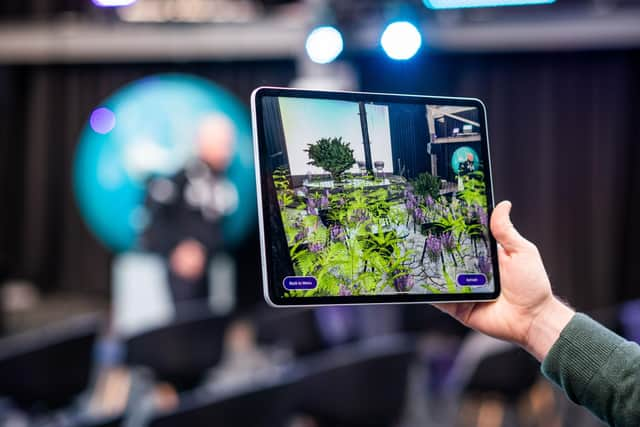Rewilding: Augmented reality app gives live tour of land after nature takeover
Now you don't have to.
A new custom-built app can help, using augmented reality to let a user visualise the transformation of a garden, field, hillside or any other piece of land if wild plants and trees were encouraged to take root and thrive.
The ground-breaking digital device creates a ‘virtual’ picture of a chosen site after assessing its exact location, geography and altitude on earth using satellite technology.


Advertisement
Hide AdAdvertisement
Hide AdThen it will suggest native species that can survive there, bringing to life a vision of how the place could look in the future if rewilded.
It will include links to local rewilding sites and provide information on the benefits of natural habitats for biodiversity and the environment.
It’s anticipated that the app could be used by a wide range of people and organisations with an interest in rewilding, from eco-minded individuals and landowners to schools, businesses and conservation groups.
The tool, part of a non-commercial venture, has been created by the Scottish team from international professional services company Accenture.
It is still in development but a prototype was unveiled to a worldwide audience earlier this month at the COP26 climate summit in Glasgow.
The concept was a winning entry in the firm’s global Eco Innovation Challenge, an initiative aimed at driving forward sustainability commitments and addressing some of the world’s biggest environmental issues.
It was selected from more than 1,200 ideas submitted to tackle seven ‘grand challenges’: circular packaging; clean energy at home; climate resilience; future of food; green supply chains; rewilding land; and sustainable cloud.
As well as their idea being put forward for judging from sector experts, the Scottish team’s winning project was also subject to a popular vote, involving more than 7,000 Accenture people across 50 countries.
Advertisement
Hide AdAdvertisement
Hide AdEdinburgh-based Hayley Whyte, who was part of the winning team, said: “People can struggle to visualise what a landscape could look like after rewilding.
“Augmented reality technology can inspire them to make sustainable choices.
“Using the app they can walk about and get a ‘live’ guided tour of what their landscape could look like if nature was enabled to reclaim it.”
Rewilding is a conservation technique that relies on leaving nature to take care of itself, enabling natural processes to shape land and sea, repair damaged ecosystems and restore degraded landscapes.
The new technology is already winning approval from rewilding supporters.
“The principle of this app is brilliant,” said Peter Cairns, executive director of Scotland: The Big Picture.
“Enabling people to visualise what a nature-rich Scotland could look like in the future is hugely inspiring and makes for a really powerful communications tool.”
Frans Schepers, co-founder and managing director of Rewilding Europe was one of the judges. He said: “This idea hits the nail on the head.
Advertisement
Hide AdAdvertisement
Hide Ad“We need to stop treating the loss of biodiversity as a problem child and tackle it from the root, help people to imagine the rich environment we once had, and show them that we have it in our grasp to bring it back through rewilding.”
The Scottish Rewilding Alliance recently called for Scotland to be declared the world’s first ‘rewilding nation’.
Recent research by the Scottish Rewilding Alliance and Accenture suggests three-quarters of Scots would support rewilding but don’t currently know how, while four out of five people would be interested to learn more about the concept.
Accenture has committed £100,000 to the development of the app, with a view that it will ultimately be adopted for use by a charity partner.
Ms Whyte hopes the gadget will serve as an educational tool with a wide range of applications, with a long-term goal of making sure it is free to use for anyone who wants it.
A finished version is expected to be launched next year.
A message from the Editor:
Thank you for reading this article. We’re more reliant on your support than ever as the shift in consumer habits brought about by coronavirus impacts our advertisers.
If you haven’t already, please consider supporting our trusted, fact-checked journalism by taking out a digital subscription.
Comments
Want to join the conversation? Please or to comment on this article.
